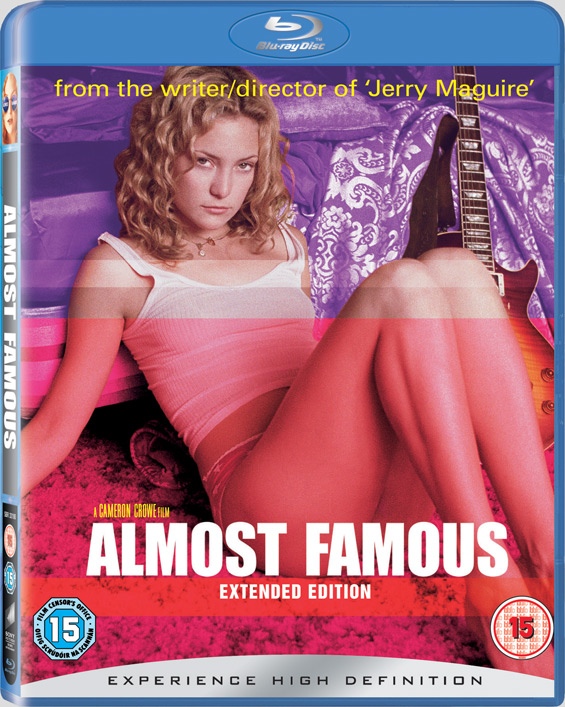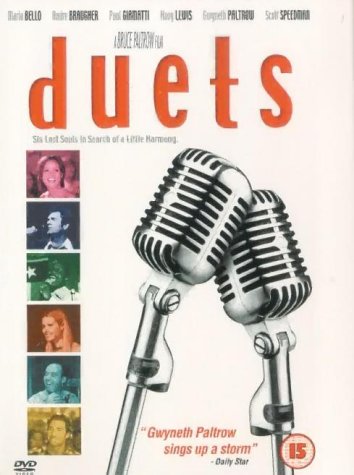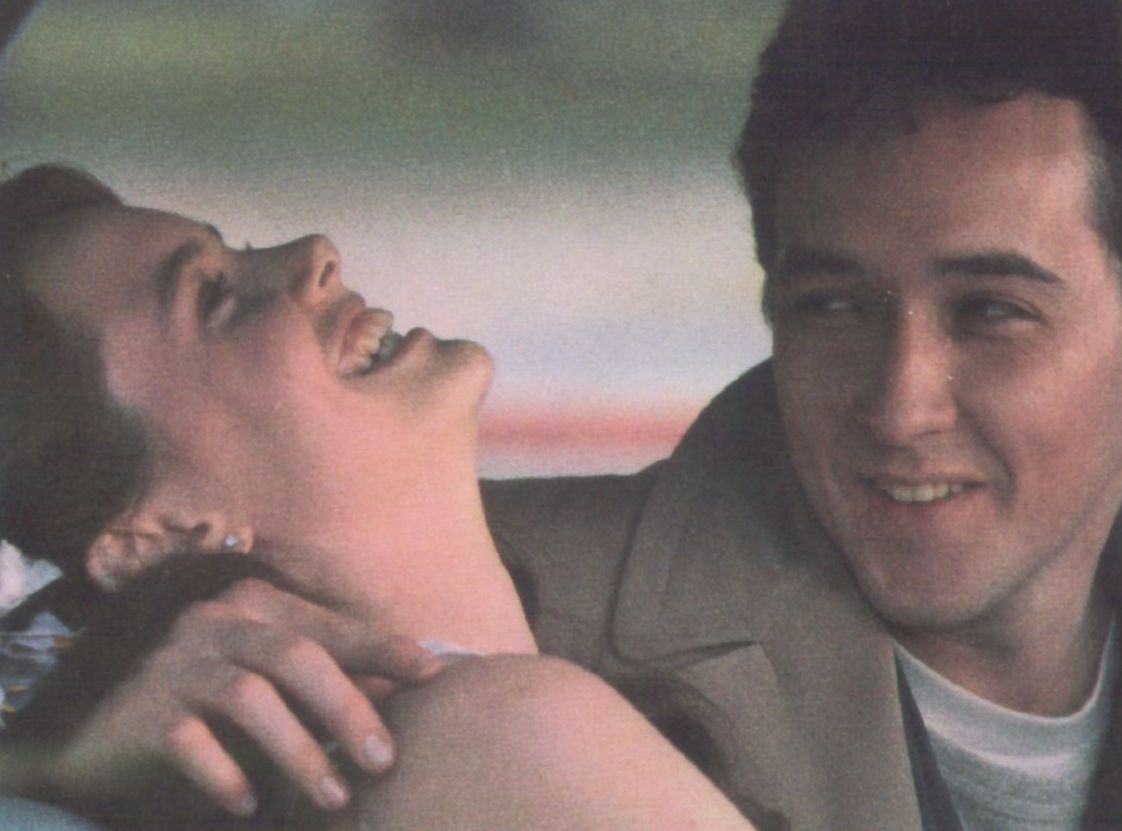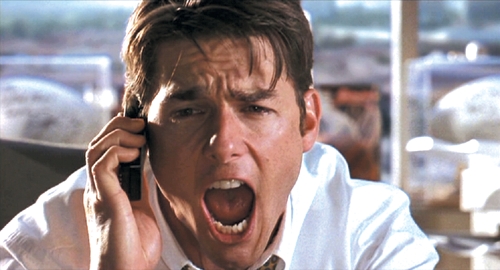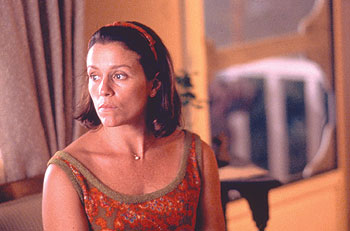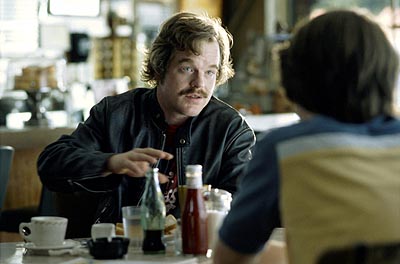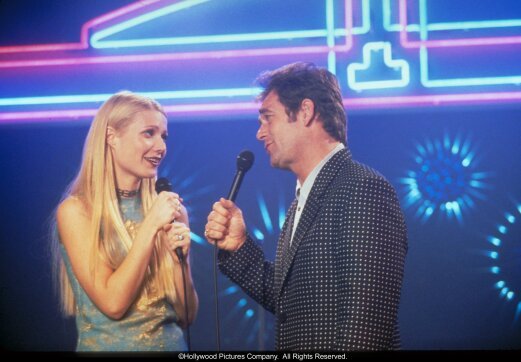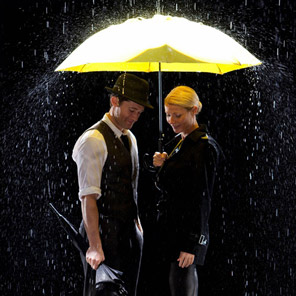From the Chicago Reader (September 22, 2000). — J.R.
Almost Famous
Rating ** Worth seeing
Directed and written by Cameron Crowe
With Patrick Fugit, Billy Crudup, Frances McDormand, Kate Hudson, Philip Seymour Hoffman, and Zooey Deschanel.
Duets
Rating ** Worth seeing
Directed by Bruce Paltrow
Written by John Byrum
With Maria Bello, Andre Braugher, Paul Giamatti, Huey Lewis, Gwyneth Paltrow, Scott Speedman, Kiersten Warren, and Angie Dickinson.
Cameron Crowe’s first feature as writer-director, Say Anything… (1989), lost money, which broke my heart. His third feature, Jerry Maguire (1996), cleaned up, which broke my spirit. (In between was another romantic comedy, the 1992 Singles, which I barely remember.) You might conclude that I was out of step with the audiences that passed on Say Anything… — though I was hardly the only reviewer who fell for it — and with those who went to Jerry Maguire in droves. I prefer to believe that I was out of step with the publicity for each movie. Say Anything… didn’t get much. But Jerry Maguire was pushed hard, as a Tom Cruise movie rather than anything created by a mere writer-director, and much of it struck me as transparent Oscar mongering — with the film’s “Show me the money!” mantra brandished as shamelessly as Paul Newman’s line about Fast Eddie being back in The Color of Money. To a large extent, the movie came across as a collection of sound bites with added filler.
Almost Famous is more directly autobiographical than Crowe’s earlier features — charting the adventures of a precocious 15-year-old rock journalist named Willie Miller (Patrick Fugit) as he travels cross-country with a band in 1973, trying to write an article about the tour for Rolling Stone — and it finds a middle ground between the raw feelings of Say Anything… and the calculated showboating of Jerry Maguire. Its focus is again on teenage experience — as was Crowe’s book on which Fast Times at Ridgemont High (1982) was based — and that’s probably what makes it seem like he’s getting back to his roots and what he does best. But it’s also about the subtle and not-so-subtle negotiations between being a journalist and being a groupie, which gives it some passing relation to the fascinating (if poorly edited and organized) interview book Crowe recently did with Billy Wilder, Conversations With Wilder.
Almost Famous doesn’t offer an infallible feeling for the period; it captures the 70s sensibility mainly in flashes and occasionally flubs it. (If anyone ever said the “F word” for “fuck” back then, I never heard it.) The movie’s best evocation of a period flavor is a simple yet eloquent succession of album covers in the 1969 prologue, when 11-year-old Willie thumbs through the records bequeathed to him by his older sister Anita (Zooey Deschanel), who’s fled their strict college-professor mother (Frances McDormand) to become a stewardess, using a cut from one of the albums to explain why she decided to go.
Yet the movie does capture how it feels to be a teenager in any period. One particularly sweet touch is the way Willie lowers his voice about an octave every time he speaks on the phone to a Rolling Stone editor — a riff on the way he and Penny Lane (Kate Hudson), a groupie who’s following the same band, Stillwater, admit to each other that they’re really not 18, but 17…16…(gulp) 15.
Technically speaking, Penny Lane isn’t a groupie but a “band aid” — which, according to her, means that she has sex with musicians not because they’re famous but because she likes their music. The distinction may seem small, but Crowe treats it with so much respect that it’s obvious he feels implicated in its nuances, which are largely what this movie’s about. (Like Willie, he started out as a rock journalist at 15 and joined the staff of Rolling Stone only a year later.) Semiautobiographical Willie links up with the fictional Stillwater because real-life rock critic Lester Bangs (Crowe’s mentor as well as Willie’s, beautifully and hilariously played by Philip Seymour Hoffman) assigns him a piece for Creem about the real-life band Black Sabbath. Dutifully arriving at a Black Sabbath concert, Willie heads backstage before the music starts and gets turned away by a bouncer; he’s then befriended by Penny Lane, who’s waiting for the arrival of Russell (Billy Crudup) — lead guitar for Stillwater, the opening band — and who eventually sneaks Willie in with her own teenybopper entourage.
The moral education that follows is fairly predictable — rock musicians are nice guys, except when they aren’t — but Crowe follows its contours with a sharp eye for detail and genuine sympathy for the pathos of some of the delusions involved. (Not surprisingly, he’s especially good when it comes to the music, and if I were more of a rock aficionado I’d probably like this movie better.) He’s also pretty funny when it comes to the pretensions of the rock publications, which are made to seem scarcely less self-infatuated and glib than the rock stars.
Duets, another comedy that opened last week, also focuses on cross-country pop-music events, in this case karaoke competitions. It seems to have fewer commercial calling cards at its disposal; the main one seems to be Gwyneth Paltrow, whose presence is partly accounted for by her father, Bruce, being the director. Apart from Huey Lewis, Andre Braugher, and Angie Dickinson in a cameo, most of the other cast members — a lively bunch — are unfamiliar, which suits the characters they’re playing. But the name in the credits that really sparks my interest is screenwriter John Byrum, who wrote and directed Inserts (1976), Heart Beat (1980), and The Razor’s Edge (1984) but hasn’t been heard from in movies for some time. (His first play, with the intriguing title Preston Sturges Died Here, premiered in Los Angeles six years ago.)
Duets is the first feature about karaoke I’ve seen, and Byrum uses it as a suggestive metaphor for the dreams of three sets of characters who’ve lost their way in terms of their personal and family identities: a karaoke hustler (Huey Lewis) who meets his daughter — a Vegas showgirl played by Paltrow — for the first time at the funeral of her mother; a traveling salesman (Paul Giamatti) who flips his lid after flying to Houston instead of Orlando and then going home to an indifferent wife and kids, and who eventually splits and hooks up with an ex-con (Andre Braugher); and a young cabdriver (Scott Speedman) who reluctantly agrees to drive a waitress and part-time hooker (Maria Bello) out west. The salesman story has the most weight and substance, evoking one of the middle-period novels of Kurt Vonnegut Jr. about all-American burnout, and it’s helped immeasurably by warm and nuanced performances of Giamatti and Braugher.
The rough edges of the three stories — which are intercut until they converge at a karaoke contest in Omaha, Nebraska — are smoothed over by the karaoke sessions, which often expose musical narcissism as enjoyably as Almost Famous does. In fact, the musical moments help one forget the absurdity of some of the plot ideas, such as the very notion of a karaoke hustler. Byrum is evidently borrowing from The Hustler and its portrait of pool-table narcissism by Paul Newman’s Fast Eddie — which gave way 25 years later to Tom Cruise’s narcissism as Eddie’s protege in The Color of Money (for which Newman was allowed to collect the Oscar he deserved for The Hustler). A decade after that Cruise played another kind of narcissistic hustler, the sports agent in Jerry Maguire.
Come to think of it, being a groupie (or “band aid”) and singing in a karaoke bar may not be all that different. Both involve disenfranchised people — wounded narcissists basking in a kind of reflected glory — and both these comedies are preternaturally attentive to and touching about the ways these second-class citizens learn to take care of one another, dressing one another’s wounds before they return to the fray.

